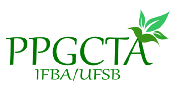Banca de QUALIFICAÇÃO: RAIANE SILVA DA CRUZ
Uma banca de QUALIFICAÇÃO de MESTRADO foi cadastrada pelo programa.STUDENT : RAIANE SILVA DA CRUZ
DATE: 05/10/2023
TIME: 09:00
LOCAL: Universidade Federal do Sul da Bahia
TITLE:
Evaluation of contamination by microplastics in a treatment plant of water
KEY WORDS:
plastic waste; drinking water; pollution; environment; human health
PAGES: 72
BIG AREA: Ciências Exatas e da Terra
AREA: Química
SUBÁREA: Química Analítica
SPECIALTY: Análise de Traços e Química Ambiental
SUMMARY:
Microplastic (PM) is categorized as a new class of contaminants, presenting solid plastic
particle insoluble in water with any dimension between 1 μm and 1,000 μm. Its origin is
through industrial sources and the plastic fragmentation process that results in smaller
particles, becoming a persistent and ubiquitous pollutant in the environment. The release of
PMs into the environment can have several negative effects on ecosystems and human
health, due to their hydrophobicity, being able to adsorb organic pollutants, including
persistent organic pollutants (POPs) and heavy metals, becoming vectors of hazardous
chemicals. In the body of human beings these compounds mimic natural hormones and
disturb the body's finely balanced endocrine system, being associated with a multitude of
diseases and disorders linked to hormonally active substances. Conventional drinking water
treatment is expected to provide an effective barrier for a wide range of particle sizes, as
the presence of microplastics can have implications for toxicity. In this context, an attempt
was made to investigate the presence of microplastics in water samples submitted to
conventional treatment in the city of Porto Seguro - BA, which is the first research
developed in the region, which may highlight the scenario of pollution by PMs in drinking
water, raising discussions about the impacts on the environment and human health. Faced
with the lack of standardization of the methodologies that involve this problem, in order to
achieve the results, a low-cost methodology was developed, with the objective of
optimizing the extraction of micro particles present in the water. Experimental studies were
carried out in the laboratory using water (H2O) and sodium chloride (NaCl) solutions to
adjust the density to allow the floating of the six main types of polymers most used today,
allowing their flotation and extraction for analysis. Results already show a recovery rate
ranging from 60% to 100%, proving to be efficient in its application, even in higher density
polymers (PET and PVC) that have a greater deficiency in the extraction and identification
process, these achieved a recovery of 65% to 90%. Allowing simple investigation and
understanding of microplastic contamination as well as population exposure to PMs
through supplied water.
COMMITTEE MEMBERS:
Presidente - 3029055 - SILVIO TAROU SASAKI
Interno - ***.287.925-** - ALLISON GONÇALVES SILVA - IFBA
Interno - 3044886 - MARIO MARQUES DA SILVA JUNIOR
Externa ao Programa - 2698282 - TATIANA PINHEIRO DADALTO - UFSBExterna à Instituição - Tatiane Combi - UFBA
Externa à Instituição - JULIANA LEONEL - UFSC



